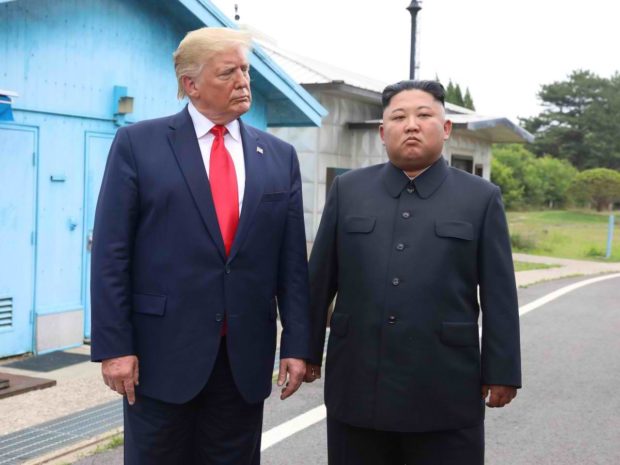
US President Donald Trump (right) and North Korean leader Kim Jong-un. Yonhap via The Korea Herald/Asia News Network
WASHINGTON — The top US envoy for North Korea said Monday that another summit between President Donald Trump and North Korean leader Kim Jong-un is unlikely before the November presidential election in the United States.
Stephen Biegun, deputy secretary of state and lead negotiator on North Korea’s nuclear weapons program, made the comment during a virtual forum hosted by the German Marshall Fund of the United States, a think tank headquartered in Washington.
“I think it’s probably unlikely between now and the US election,” he said in response to a question about the possibility of Trump and Kim meeting again.
“In the time remaining and with the wet blanket the COVID-19 has put over the entire world it’s hard to envision the circumstances where we could do an in-person international summit, but certainly engagement between the two sides, and we’re prepared to do so,” he said.
Trump and Kim have met three times since June 2018 to try to reach a deal on dismantling the North’s nuclear weapons program in exchange for US concessions.
But working-level negotiations have failed to make progress amid wide gaps over the scope of North Korea’s denuclearization and sanctions relief from the US.
Biegun expressed frustration that North Korean officials have not been authorized to discuss the nuclear weapons program in their meetings.
The last time the two sides met was in Sweden in October.
“Getting a deal with North Korea is going to depend upon the North Koreans, not just us,” he said. “We’ve laid out quite a robust and detailed plan that if the North Koreans would engage with us in negotiation, we can make progress very quickly.”
Biegun said the US goal remains the “final and complete denuclearization of the Korean Peninsula.” At the same time, he said, “We do believe there is a much brighter future available on the Korean Peninsula for all the people.”
The envoy added that given the economic hardships in North Korea, which he said are likely to get worse, it is puzzling why the regime refuses to engage “at a political level.”
“The pressures are immense on the regime and the regime continues to prioritize expenditure of its resources on its military capabilities,” he said.
“So that also is going to require us to maintain a full deterrent, which we will and we do — I don’t think anybody doubts that,” Biegun continued, referring to the US military’s readiness to respond to any North Korean aggression, “and continue to leave the door open to diplomacy.”
“We believe there is still time for the United States and North Korea to make substantial progress in the direction that we believe that both sides want to go,” he added.
Trump has publicly been quiet on North Korea as he deals with the coronavirus pandemic and his reelection campaign, despite earlier touting his meetings with Kim as a foreign policy victory that averted war with the North.
Last week, Trump’s former national security adviser, John Bolton, wrote damning accounts of the US president’s engagements with Kim in his newly published memoir, “The Room Where It Happened.”
According to the book, Trump told South Korean President Moon Jae-in ahead of his third meeting with Kim at the Demilitarized Zone in June 2019 that he might ask that the next US-North Korea summit be after the US elections. Yonhap